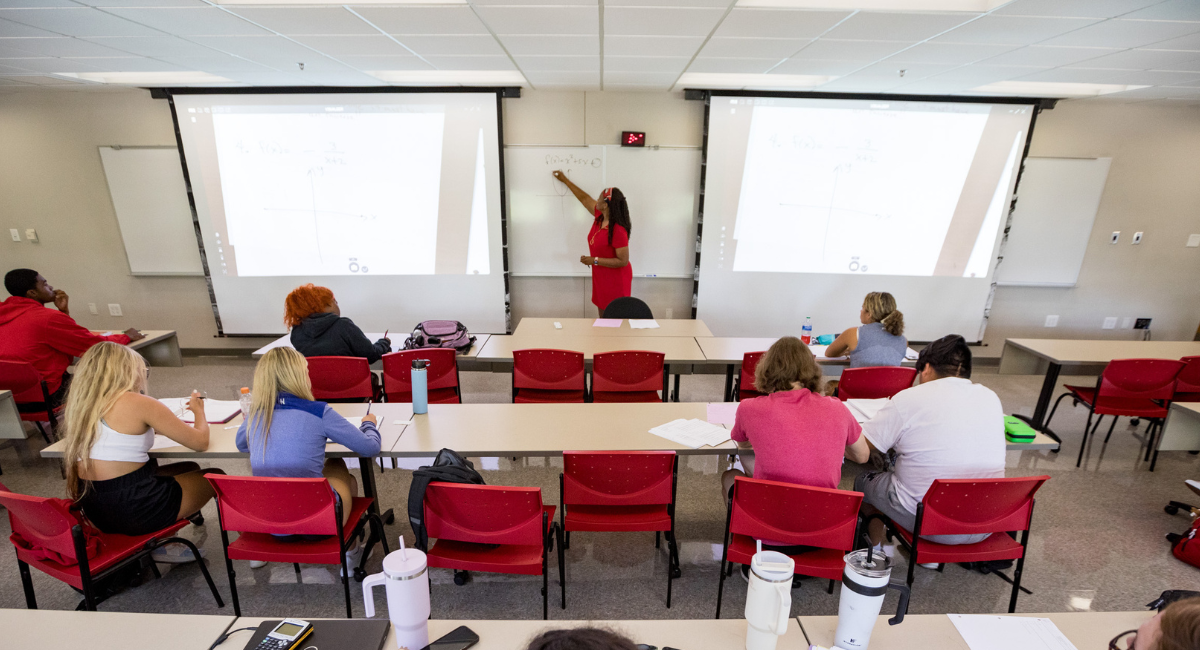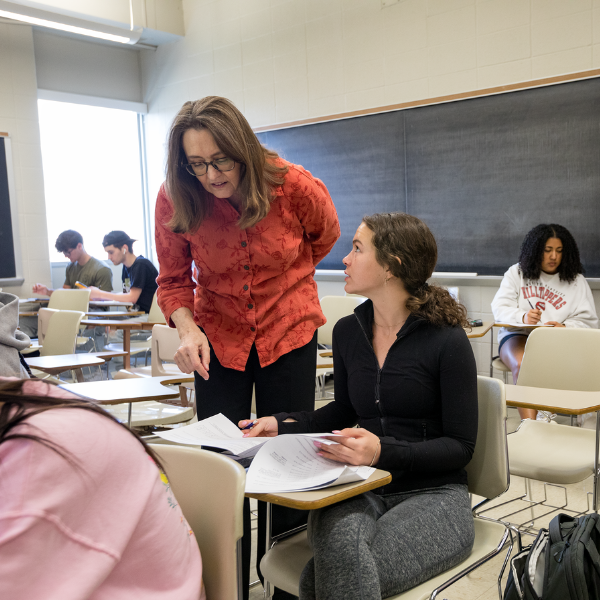Mathematics, Bachelor of Arts (528)
- Undergraduate
- AB
- Science and Engineering
- Mathematics
Overview
This major is for students that intend to pursue a graduate degree in mathematics, and/or intend to pursue employment in business and industry. This major does not lead to teacher certification.
Concentrations
- Fundamental Analysis & Discrete (MAAD)
- Fundamentals of Applied Mathematics (MAAM)
- Fundamentals of Math Studies (MAMS)
Program Requirements (51 hours)
A baccalaureate degree requires a minimum of 120 unduplicated semester hours. More information can be found at www.wku.edu/registrar/degree_certification.php.
Students who began WKU in the Fall 2014 and thereafter should review the Colonnade requirements located at: https://www.wku.edu/colonnade/colonnaderequirements.php.
A major in mathematics provides a Bachelor of Arts degree and requires either a minimum of 36-39 semester hours for a general major with a minor or second major or a minimum of 51 semester hours for an extended major. Note: All mathematics courses listed as prerequisites for other mathematics courses must have been completed with a grade of “C” or better.
Students in the extended major (528) are required to satisfy a computational requirement by completing two courses chosen from CS 180, CS 290 , STAT 330, MATH 371, PHYS 316, or PHYS 318. [If MATH 371 is selected to fulfill this requirement, it cannot also be used as an elective in the extended major (528).]
To prepare for graduate study in mathematics, the student must complete a minimum of 51 hours of mathematics with the following requirements:
Core Courses
| Code | Title | Hours |
|---|---|---|
| MATH 136 | Calculus I | 4 |
| MATH 137 | Calculus II | 4 |
| MATH 237 | Multivariable Calculus | 4 |
| MATH 307 | Introduction to Linear Algebra | 3 |
| MATH 310 | Introduction to Discrete Mathematics | 3 |
| MATH 317 | Introduction to Algebraic Systems | 3 |
| MATH 337 | Elements of Real Analysis | 3 |
| MATH 431 | Intermediate Analysis I | 3 |
| MATH 498 | Senior Seminar | 1-3 |
| Total Hours | 28-30 | |
Select one of the following concentrations:
B1: Fundamentals of Analysis and Discrete Mathematics
| Code | Title | Hours |
|---|---|---|
| MATH 417 | Algebraic Systems | 3 |
| MATH 439 | Topology I | 3 |
| MATH 450 | Complex Variables | 3 |
| Select two of the following: | 6 | |
MATH 323 | Geometry I | |
MATH 415 | Algebra and Number Theory | |
MATH 473 | Introduction to Graph Theory | |
| Select six elective hours from the following: | 6 | |
MATH 275 | Introductory Topics in Mathematics (up to 3 hours) | |
STAT 301 | Introductory Probability and Applied Statistics | |
MATH 305 | Introduction to Mathematical Modeling | |
MATH 323 | Geometry I | |
MATH 331 | Differential Equations | |
MATH 370 | Applied Techniques in Mathematics | |
MATH 382 | Probability and Statistics I | |
MATH 398 | Seminar (up to 3 hours) | |
MATH 405 | Numerical Analysis I | |
MATH 406 | Numerical Analysis II | |
MATH 409 | History of Mathematics | |
MATH 415 | Algebra and Number Theory | |
MATH 435 | Partial Differential Equations | |
MATH 470 | Introduction to Operations Research | |
MATH 473 | Introduction to Graph Theory | |
MATH 475 | Selected Topics in Mathematics (up to 6 hours) | |
MATH 482 | Probability and Statistics II | |
| Total Hours | 21 | |
B2: Fundamentals of Applied Mathematics
| Code | Title | Hours |
|---|---|---|
| MATH 331 | Differential Equations 1 | 3 |
| MATH 370 | Applied Techniques in Mathematics 1 | 3 |
| MATH 382 | Probability and Statistics I 1 | 3 |
| MATH 405 | Numerical Analysis I 1 | 3 |
| Select two of the following: 1 | 6 | |
MATH 305 | Introduction to Mathematical Modeling | |
MATH 406 | Numerical Analysis II | |
MATH 435 | Partial Differential Equations | |
MATH 470 | Introduction to Operations Research | |
MATH 482 | Probability and Statistics II | |
| Select three credit hours of the following: | 3 | |
MATH 275 | Introductory Topics in Mathematics | |
STAT 301 | Introductory Probability and Applied Statistics | |
MATH 305 | Introduction to Mathematical Modeling | |
MATH 323 | Geometry I | |
MATH 398 | Seminar | |
MATH 406 | Numerical Analysis II | |
MATH 409 | History of Mathematics | |
MATH 415 | Algebra and Number Theory | |
MATH 417 | Algebraic Systems | |
MATH 435 | Partial Differential Equations | |
MATH 439 | Topology I | |
MATH 450 | Complex Variables | |
MATH 470 | Introduction to Operations Research | |
MATH 473 | Introduction to Graph Theory | |
MATH 475 | Selected Topics in Mathematics | |
MATH 482 | Probability and Statistics II | |
| Total Hours | 21 | |
B3: Fundamentals of Mathematical Studies
| Code | Title | Hours |
|---|---|---|
| MATH 450 | Complex Variables | 3 |
| Select two of the following: | 6 | |
MATH 405 | Numerical Analysis I | |
MATH 406 | Numerical Analysis II | |
MATH 409 | History of Mathematics | |
MATH 415 | Algebra and Number Theory | |
MATH 417 | Algebraic Systems | |
MATH 435 | Partial Differential Equations | |
MATH 439 | Topology I | |
MATH 470 | Introduction to Operations Research | |
MATH 473 | Introduction to Graph Theory | |
MATH 482 | Probability and Statistics II | |
| Select twelve elective hours of the following: | 12 | |
MATH 275 | Introductory Topics in Mathematics (up to 3 hours) | |
STAT 301 | Introductory Probability and Applied Statistics | |
MATH 305 | Introduction to Mathematical Modeling | |
MATH 323 | Geometry I | |
MATH 331 | Differential Equations | |
MATH 370 | Applied Techniques in Mathematics | |
MATH 382 | Probability and Statistics I | |
MATH 398 | Seminar (up to 3 hours) | |
MATH 405 | Numerical Analysis I | |
MATH 406 | Numerical Analysis II | |
MATH 409 | History of Mathematics | |
MATH 415 | Algebra and Number Theory | |
MATH 435 | Partial Differential Equations | |
MATH 470 | Introduction to Operations Research | |
MATH 473 | Introduction to Graph Theory | |
MATH 475 | Selected Topics in Mathematics (up to 6 hours) | |
MATH 482 | Probability and Statistics II | |
| Total Hours | 21 | |
- 1
Students may take certain 500-level mathematics courses for undergraduate credit in place of courses listed in items B1i, B1ii, B2i, B2ii, B3i, or B3ii with the approval of the mathematics department chair. No minor or second major for the extended major is required.
The Department of Mathematics offers a Joint Undergraduate Master's Program (JUMP) which provides academically outstanding students the opportunity to complete both an undergraduate Bachelor of Arts degree and a graduate Master of Science degree in an accelerated timeframe. The MS in Mathematics prepares students to be competitive applicants for admission into a Ph.D. program and/or for positions where strong research skills are needed. Contact the graduate program coordinator for additional information, see https://catalog.wku.edu/graduate/science-engineering/mathematics/mathematics-ms/
This JUMP program allows students to start working toward their MS in Mathematics with a concentration in General Mathematics, Computational Mathematics, or Mathematical Economics (Ref: 085) while completing their Bachelor of Arts degree in Mathematics (Ref: 528 and 728) or a Bachelor of Science degree in Mathematical Economics (Ref: 731). Undergraduate students admitted into JUMP may take graduate courses that count toward both undergraduate and graduate degrees. Up to 12 credit hours can be double-counted toward both degrees, and up to 15 hours of graduate courses can be taken while a student is completing the undergraduate degree. The key benefit of the JUMP program is that it allows students to earn a bachelor’s and a master’s degree in an accelerated timeframe. For more information, see https://www.wku.edu/math/.
To be considered for admission to the JUMP program to earn a BA in Mathematics (or a BS in Mathematical Economics) and a MS in Mathematics in an accelerated timeframe, a student must meet the following requirements:
Be a Mathematics or a Mathematical Economics major (includes programs with reference numbers 528, 728, and 731);
Have completed at least 60 hours total, with at least 24 hours earned at WKU;
Have at least 15 or more credit hours remaining to complete the bachelor’s degree;
Have completed or be enrolled in 15 credit hours in Mathematics;
Have a minimum cumulative undergraduate GPA of 3.25;
Have one of the following:
a. 3.25 GPA in the Mathematics or Mathematical Economics major AND a grade of B or higher in at least one of the courses: MATH 307, MATH 310, MATH 317, MATH 337, MATH 439;
b. 3.0 GPA in the Mathematics or Mathematical Economics major AND a grade of B or higher in at least two of the courses: MATH 307, MATH 310, MATH 317, MATH 337, MATH 439.
All applicants to Mathematics JUMP must submit to a Graduate Coordinator the following documents for consideration: two letters of recommendation from a WKU Mathematics faculty members and a statement of purpose outlining academic goals and motivation for pursuing the JUMP program.
Finish in Four Plans
Fundamentals of Analysis & Discrete Mathematics Concentration
| First Year | |||
|---|---|---|---|
| Fall | Hours | Spring | Hours |
| MATH 136 | 4 | MATH 137 | 4 |
| CS 180 | 4 | CS 290 or STAT 330 | 3-4 |
| ENG 100 | 3 | COMM 145 | 3 |
| Colonnade - Natural & Physical Sciences w/ lab | 3-5 | HIST 101 or HIST 102 | 3 |
| Colonnade - Social & Behavioral Science | 3 | ||
| 14-16 | 16-17 | ||
| Second Year | |||
| Fall | Hours | Spring | Hours |
| MATH 307 | 3 | MATH 237 | 4 |
| MATH 310 | 3 | Math upper-division Elective | 3 |
| ENG 200 | 3 | Colonnade - Natural & Physical Sciences w/ no lab | 3 |
| Colonnade - Arts & Humanities | 3 | Colonnade - Writing in the Disciplines | 3 |
| World Language Requirement or General Elective | 3 | General Elective | 3 |
| 15 | 16 | ||
| Third Year | |||
| Fall | Hours | Spring | Hours |
| MATH 317 | 3 | MATH 337 | 3 |
| Math upper-division Elective | 3 | MATH 417 | 3 |
| Colonnade - Social & Cultural | 3 | Colonnade - Local to Global | 3 |
| Colonnade - Systems | 3 | General Elective | 3 |
| General Elective | 3 | General Elective | 3 |
| 15 | 15 | ||
| Fourth Year | |||
| Fall | Hours | Spring | Hours |
| MATH 431 | 3 | MATH 450 | 3 |
| MATH 439 | 3 | MATH 498 | 3 |
| Math upper-division Elective | 3 | Math upper-division Elective | 3 |
| General Elective | 3 | General Elective | 3 |
| General Elective | 2 | General Elective | 3 |
| 14 | 15 | ||
| Total Hours 120-123 | |||
Fundamentals of Applied Math Concentration
| First Year | |||
|---|---|---|---|
| Fall | Hours | Spring | Hours |
| MATH 136 | 4 | MATH 137 | 4 |
| CS 180 | 4 | CS 290 or STAT 330 | 3-4 |
| ENG 100 | 3 | COMM 145 | 3 |
| Colonnade - Natural & Physical Sciences w/ lab | 3-5 | HIST 101 or HIST 102 | 3 |
| Colonnade - Social & Behavioral Science | 3 | ||
| 14-16 | 16-17 | ||
| Second Year | |||
| Fall | Hours | Spring | Hours |
| MATH 307 | 3 | MATH 237 | 4 |
| MATH 310 | 3 | MATH 331 | 3 |
| ENG 200 | 3 | Math upper-division Elective | 3 |
| Colonnade - Arts & Humanities | 3 | Colonnade - Natural & Physical Sciences w/ no lab | 3 |
| World Language Requirement or General Elective | 3 | Colonnade - Writing in the Disciplines | 3 |
| 15 | 16 | ||
| Third Year | |||
| Fall | Hours | Spring | Hours |
| MATH 317 | 3 | MATH 337 | 3 |
| MATH 382 | 3 | MATH 370 | 3 |
| MATH 405 | 3 | Colonnade - Local to Global | 3 |
| Colonnade - Social & Cultural | 3 | Colonnade - Systems | 3 |
| General Elective | 3 | General Elective | 3 |
| 15 | 15 | ||
| Fourth Year | |||
| Fall | Hours | Spring | Hours |
| MATH 431 | 3 | MATH 498 | 3 |
| Math upper-division Elective | 3 | Math upper-division Elective | 3 |
| General Elective | 3 | General Elective | 3 |
| General Elective | 3 | General Elective | 3 |
| General Elective | 2 | General Elective | 3 |
| 14 | 15 | ||
| Total Hours 120-123 | |||
Fundamentals of Math Studies Concentration
| First Year | |||
|---|---|---|---|
| Fall | Hours | Spring | Hours |
| MATH 136 | 4 | MATH 137 | 4 |
| CS 180 | 4 | CS 290 or STAT 330 | 3-4 |
| ENG 100 | 3 | COMM 145 | 3 |
| Colonnade - Natural & Physical Sciences w/ lab | 3-5 | HIST 101 or HIST 102 | 3 |
| Colonnade - Social & Behavioral Science | 3 | ||
| 14-16 | 16-17 | ||
| Second Year | |||
| Fall | Hours | Spring | Hours |
| MATH 307 | 3 | MATH 237 | 4 |
| MATH 310 | 3 | Math upper-division Elective | 3 |
| ENG 200 | 3 | Math upper-division Elective | 3 |
| Colonnade - Arts & Humanities | 3 | Colonnade - Natural & Physical Sciences w/ no lab | 3 |
| World Language Requirement or General Elective | 3 | Colonnade - Writing in the Disciplines | 3 |
| 15 | 16 | ||
| Third Year | |||
| Fall | Hours | Spring | Hours |
| MATH 317 | 3 | MATH 337 | 3 |
| Math upper-division Elective | 3 | MATH 450 | 3 |
| Colonnade - Local to Global | 3 | Math upper-division Elective | 3 |
| Colonnade - Social & Cultural | 3 | Colonnade - Systems | 3 |
| General Elective | 3 | General Elective | 3 |
| 15 | 15 | ||
| Fourth Year | |||
| Fall | Hours | Spring | Hours |
| MATH 431 | 3 | MATH 498 | 3 |
| Math upper-division Elective | 3 | Math upper-division Elective | 3 |
| General Elective | 3 | General Elective | 3 |
| General Elective | 3 | General Elective | 3 |
| General Elective | 2 | General Elective | 3 |
| 14 | 15 | ||
| Total Hours 120-123 | |||








